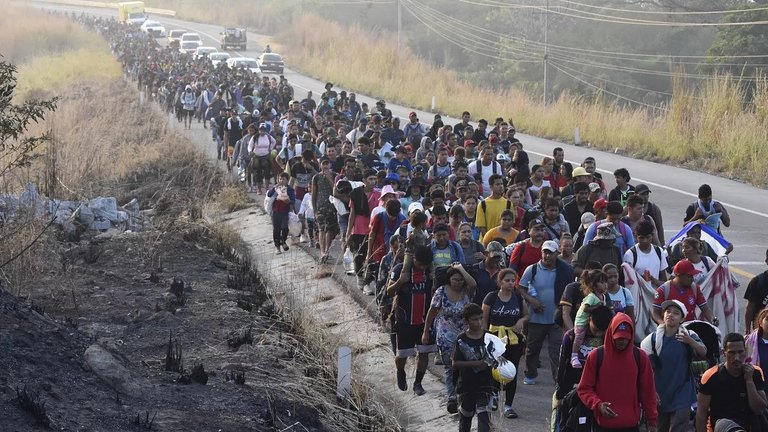
The echo of a threat
The international market continues to be restless, with some big players praying that Trump stops posting truths on his social media platform. Last Saturday it was the BRICS group's turn to receive its corresponding tariff threat, with the US president-elect promising 100% tariffs on all products arriving in the US from the bloc's countries unless they meet certain demands. “We require a commitment from these Countries that they will neither create a new BRICS Currency, nor back any other Currency to replace the mighty U.S. Dollar or, they will face 100% Tariffs, and should expect to say goodbye to selling into the wonderful U.S. Economy”, Trump said via Truth Social. Of the region, Brazil is the only full—and founding—member of the BRICS.
Rather than attacking the dominance of the dollar, what the bloc has defended is the search for alternatives to Washington's abuse of that position in terms of monetary and financial sanctions, something that particularly right now affects Russia and Iran among its full-vote members. “It's not us who refuse to use the dollar... But if [the U.S. doesn't] let us work, what can we do? We are forced to search for alternatives,” the Russian leader Vladimir Putin said. However, the mix of interests and ideologies within the BRICS already makes the search for consensual monetary alternatives difficult in itself, in addition to the fact that in any case a substantial or natural abandonment of the dollar as the global reference currency is not foreseen.
The idea that the BRICS Countries are trying to move away from the Dollar while we stand by and watch is OVER. We require a commitment from these Countries that they will neither create a new BRICS Currency, nor back any other Currency to replace the mighty U.S. Dollar or, they…
— Donald J. Trump (@realDonaldTrump) November 30, 2024
The market turmoil triggered by Trump's truths began with his threat to apply 25% tariffs to all Mexican and Canadian products entering the United States unless there was a representative change in the flow of drugs and irregular migrants across the U.S. southern and northern borders. China would be subject to an additional 10% tariffs over those being enforced. So Mexico is “listening to the wind” beyond the sovereigntist discourse that Claudia Sheinbaum has tried to recover in recent days, and Trudeau flew—literally and symbolically speaking—to Mar-a-Lago trying to appease Trump. Incidentally, all this drama has generated a rift between Mexico and Canada—envisioned by Trump?—, with Ottawa very sensitive about being lumped together with the Aztecs when it comes to the border discussion.
The threats are being taken seriously everywhere. The timing is very interesting and revealing in two measures recently adopted by Mexico, such as the raid against a supermarket of Chinese products that has been operating for a long time, or the installation of a security filter last Thursday on the Mexican side of the Secure Electronic Network for Travelers Rapid Inspection line for “detecting illicit objects or situations”. In addition, migration activists have denounced that Mexican authorities have “derailed” two small caravans that intended to reach the north-central region of the country, although this is the usual end of these efforts in recent years. Sheinbaum has pledged her word saying that these caravans are “taken care of” before arriving at the northern Mexican border. “Usually by the time they make it even 100 miles (161 km) north into Mexico, they've effectively been dissipated by the Mexican government,” a CBP official has acknowledged.
Court backs Texas over razor wire installed on US-Mexico borderhttps://t.co/IKjPtpkWxJ
— CBS 4 News (@cbs4rgv) December 1, 2024
12/1: @TxDPS Troopers encountered a group of 176 illegal immigrants, including single adults, family groups, & unaccompanied children in Maverick County. Troopers arrested 15 single illegal immigrant adults for criminal trespass. The 15 were from El Salvador, Ecuador, Cuba,… pic.twitter.com/G4ISn4Pq5l
— Chris Olivarez (@LtChrisOlivarez) December 2, 2024
A new caravan with around 1,500 migrants left Tapachula late past Sunday, made up mostly of Venezuelans fleeing the post-electoral scene there. As always, the migrants claim that they travel in this composition to avoid extortion, kidnappings, and other manifestations of the climate of insecurity that prevails in Mexico, particularly in the south. “We fear that [Trump] will close the border because [appointments via CBP One] take six to seven months,” says a Venezuelan migrant. Another migrant from the oil-producing nation says Trump “is rude.” “In Venezuela, there is a horrible crisis, we can't be in our country anymore, that's why we decided to migrate. To Donald Trump, we ask him to let us pass before he shuts everything down. It ruins our dreams and the future of our children, we want them to be well, since in our country we could not,” says a Venezuelan mother traveling with her two children. Cubans, Haitians, Hondurans, Colombians, and Guatemalans are also traveling in the caravan, most of them thinking of crowning the so-called American dream. Despite Trump's rhetoric, there were ten thousand fewer encounters with irregular migrants at the U.S.-Mexico border in November than in October, for the fewest figure since July 2020. Illegal crossings across the Canadian border saw a near halving, with 600 fewer encounters from October's 1,300.

And this is all for our report today. I have referenced the sources dynamically in the text, and remember you can learn how and where to follow the LATAM trail news by reading my work here. Have a nice day.

